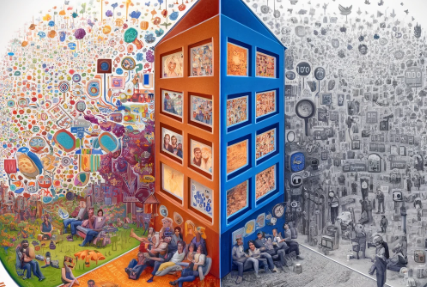The Evolution of Social Media Algorithms: From Friend Circles to Echo Chambers
In the bustling digital age, social media has evolved from simple platforms for staying in touch with friends and family to complex ecosystems influencing nearly every facet of our daily lives. At the heart of this transformation are the algorithms that dictate what we see, who we interact with, and ultimately, how we perceive the world around us.
Initially, social media algorithms had a straightforward purpose: to keep us connected with our immediate social circles. These digital matchmakers ensured that your feed was filled with life updates, photos, and events from your closest contacts. The simplicity of this approach made social media an extension of our physical interactions, a digital meeting space where connections were strengthened over shared experiences.
However, as social media platforms evolved, so did their algorithms. The pursuit of engagement drove platforms to develop algorithms that prioritize content likely to generate the most interaction, often at the expense of personal connections. This shift marked the beginning of the echo chamber effect, where users are increasingly exposed to content that reinforces their existing beliefs and interests, isolating them from diverse perspectives.
Need a hand navigating these digital landscapes? Multipost Digital is your go-to. Our cutting-edge tools empower you to make the most out of your social media content, from scheduling to analytics.
This algorithmic pivot has profound implications for our social fabric. While it's human nature to seek validation and agreement, the intensification of echo chambers on social media has exacerbated divisions, making it harder for individuals to encounter or engage with differing viewpoints. The impact extends beyond the personal, influencing everything from politics to public health, as the algorithms behind social media platforms inadvertently foster polarized communities.
Amid these challenges, there's a growing call for transparency and reform. Users and critics alike are pushing for a better understanding of how these algorithms work and advocating for changes that would reintroduce a diversity of content into our feeds. It's a complex issue, with no easy solutions, but the first step towards change is acknowledging the problem.
Thinking about leveraging social media for your brand? Let Multipost Digital guide you with a strategy that goes beyond algorithms, focusing on genuine engagement and growth.
As we look towards the future, there are signs of progress. Some platforms are experimenting with new algorithmic models designed to mitigate the echo chamber effect, offering users more control over what they see. Additionally, the rise of decentralized social media platforms presents an opportunity for a different kind of social media experience, one that prioritizes user agency over engagement metrics.
However, the responsibility doesn't lie with platforms alone. As users, we have the power to shape our social media experience. By consciously diversifying the accounts we follow and engaging with a range of content, we can counteract the echo chamber effect and encourage a more inclusive digital environment.
In conclusion, the evolution of social media algorithms from friend circles to echo chambers highlights a critical juncture in our digital lives. The path forward requires a concerted effort from platforms, users, and regulators to foster an online ecosystem that values diversity, engagement, and understanding above all. As we navigate this digital evolution, it's essential to remember the core of what made social media so appealing in the first place: the power to connect us with a world beyond our immediate horizon.
Ready to take your social media presence to the next level? Follow Multipost Digital on our social media accounts to stay ahead of the curve and keep your content fresh and engaging. Let's make digital waves together!
This journey from the inception of social media algorithms to their current state is a testament to the ever-changing nature of our digital world. As we continue to adapt and evolve with these platforms, let's strive for a future where technology serves to unite rather than divide, creating spaces that are inclusive, diverse, and reflective of the world we aspire to live in.


